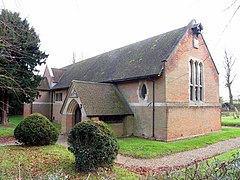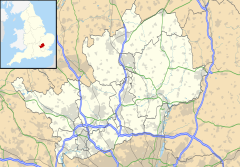Woolmer Green
| Woolmer Green | |
|---|---|
 St Michael and All Angels, Woolmer Green, by Robert Weir Schultz |
|
| Woolmer Green shown within Hertfordshire | |
| Population | 661 (2011 Census) |
| OS grid reference | TL253186 |
| District | |
| Shire county | |
| Region | |
| Country | England |
| Sovereign state | United Kingdom |
| Post town | KNEBWORTH |
| Postcode district | SG3 |
| Dialling code | 01438 |
| Police | Hertfordshire |
| Fire | Hertfordshire |
| Ambulance | East of England |
| EU Parliament | East of England |
| UK Parliament | |
Woolmer Green is a small village and civil parish in Hertfordshire, England. The 2011 census figure for the population (from the Office for National Statistics) is 661 people.
Situated between the villages of Welwyn and Knebworth, Woolmer Green was first settled in the Iron Age. The Belgae colonised the area in the 1st century BC, and later it was settled by the Romans. Many Roman artefacts have been found in the surrounding area with a bath house existing at nearby Welwyn. The village was at the junction of two thoroughfares, the Great North Road and another road called Stane Street (or Stone Street) from St Albans. The route of this road runs across the parish along the path of Robbery Bottom Lane, continuing on as a public bridleway to Datchworth and then Braughing, on its eventual way to another major Roman town, Colchester.
Thomas de Wolvesmere is recorded as having lived in a dwelling here in 1297, and his name is considered to have led to the current name of the village.
Woolmer Green has always been one of those places which is "neither here nor there". In the Middle Ages part of the village was in Mardleybury Manor, part in Rectory Manor, with the northern part owing allegiance to Broadwater Manor or Knebworth. Things have not changed; the village is still at the point where the Districts of North Hertfordshire, East Hertfordshire and Welwyn Hatfield meet.
Apart from the trade generated by travellers, life in Woolmer Green was agricultural and feudal until the middle of the nineteenth century. Things started to change, however, when the railway arrived in 1850 (although the nearby station in Knebworth was not opened until 1884 after intervention from Viscount Knebworth). The village school, which was opened a few years after this, obtained much funding from the railway.
In 1863, only a gunsmith and a shoemaker were listed in the trade directory. By 1898, when the population of Woolmer Green stood at 363 and that of Knebworth at 382, there were five shops including two beer retailers; no mention in the trade directory of the many 'front room shops'! This level of service persisted until recent years with a general store and Post Office, a baker, a small supermarket and a butcher. Sadly these have all now closed. The former Post office was later used as a hair salon, a furniture shop and most recently a wedding dress and suit hire shop which was opened in early 2016.
...
Wikipedia

